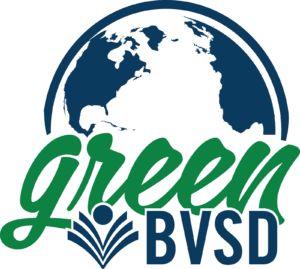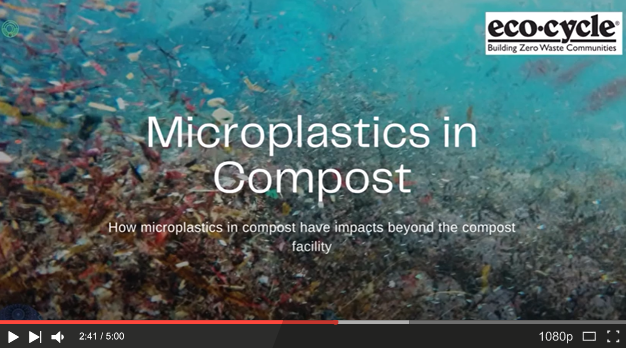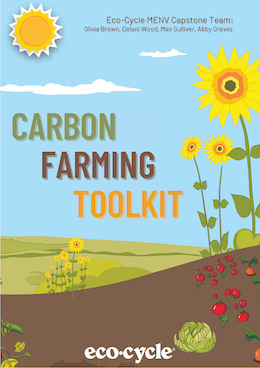Proving a Critical Nature-Based Climate Solution
In Boulder County, we generate some of the cleanest food scraps in Colorado from school cafeterias, restaurants, and food businesses that are committed to composting right. But right now, those valuable scraps are hauled more than 50 miles away to a regional compost facility.
Meanwhile, local regenerative farmers—who grow food for many of these same schools and businesses—need compost to build healthy soil. That compost could be made right here in our community, literally “on the farm.”
The nutrients in food scraps are a valuable natural resource. It doesn’t make sense to ship them out of the community. Instead, let’s deliver those resources to the local farmers who could use them to grow food for our community.
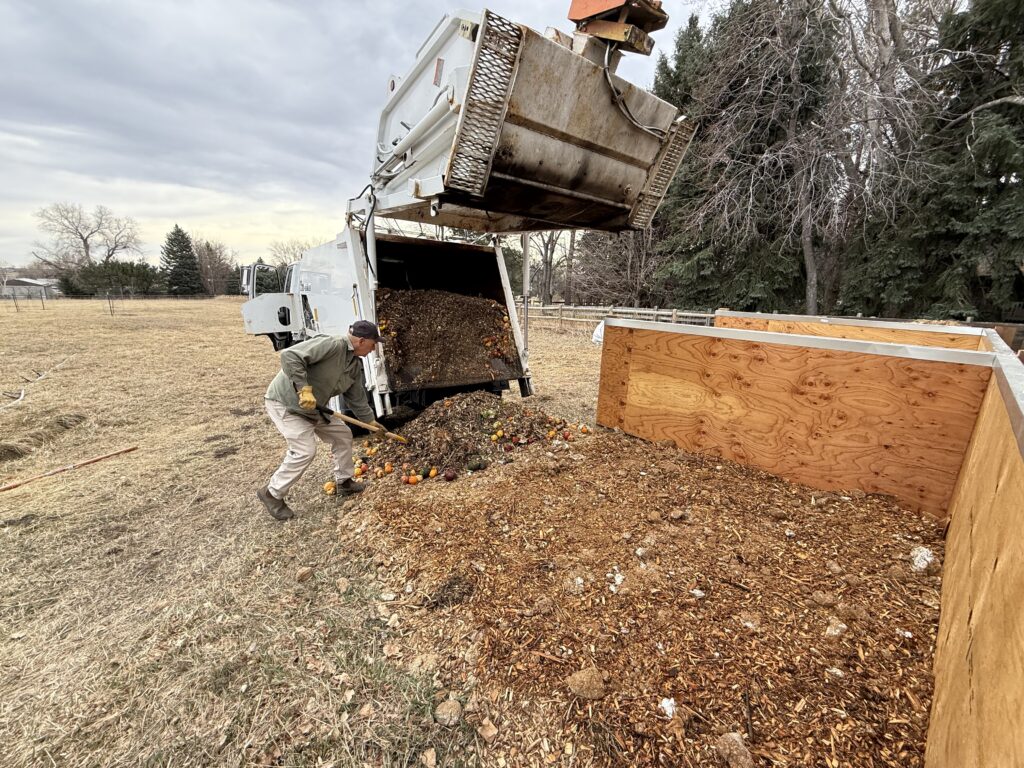
That’s where Eco-Cycle’s Farmer First Compost Program comes in. We’re working with community partners to create a closed-loop composting model that keeps organic materials like food scraps local, supports regenerative agriculture, and strengthens our food system—all while helping fight climate change.
While a centralized compost facility will still be an important part of the picture, this farm-based model is a vital step toward a circular, climate-resilient future for our community.
How the Farmer First Compost Model Works
Step 1: Eco-Cycle collects clean food scraps from community partners.
As a mission-driven company, we prioritize customer education and support, resulting in some of the cleanest organic discards generated in the county. Eco-Cycle collects food scraps from our partners—schools participating in our Green Star Schools program and select restaurants and businesses who are part of our Zero Waste hauling services—all of whom are committed to keeping their compost bins clean and free from plastic and other contaminants.
Rather than hauling these clean food scraps far away, we direct them to their best use: composting on local regenerative farms to produce high-quality compost with the purpose of building soil and growing healthy food.
Step 2: We deliver organic discards to local regenerative farms.
Instead of buying compost, local farmers can now make their own. We help train farmers on the value and process of making their own compost right on their land. We help them build on-farm composting systems—including infrastructure, pile-turning mechanisms, and temperature monitoring—to ensure the resulting compost meets the high standards of regenerative agriculture.
Step 3: Farmers apply compost to build healthy soils and fight climate change.
Once the compost is ready, farmers partnering in our Farmer First program spread it on their fields to build resilient soil that holds more water, grows stronger plants, and produces more nutrient-dense vegetables. Compost feeds the soil’s microbes—tiny organisms made largely of carbon. As soil life increases, so does its ability to store carbon, drawing it down from the atmosphere. That makes composting a powerful, nature-based climate solution.
Step 4: Grow healthy food—and close the loop.
The compost-fed soil grows fresh, nutrient-rich food—delivered right back to the community that helped make it in the first place.
Step 5: Empower communities to grow their own food.
The Farmer First model isn’t just for farms. We’re partnering with local communities—especially in low-income housing—to create small-scale composting systems that they can manage themselves. These systems transform food scraps into nutrient-rich compost for on-site gardens, helping residents grow their own fresh produce and reduce food scarcity right where they live.
Farmer First Keeps the Benefits Local
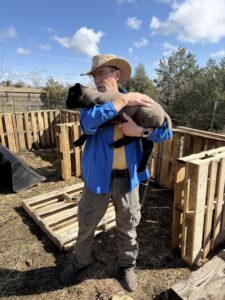
Food grown by our Farmer First partners stays in Boulder County, feeding local families and providing for schools, grocery stores, and restaurants.
Our community reaps the climate benefits, too, in the form of:
- Fewer emissions from trucking organic material long distances
- More carbon sequestered in local soils
- Stronger, more drought-resilient farmland
- Improved access to healthy food while strengthening community self-reliance.
Closing the Loop on Organic Materials in Boulder County and Creating a Multi-Scale Local Compost Network (LCN)
A centralized compost facility will be essential to creating local composting solutions for our community. The Farmer First Compost program is the on-the-ground starting point—it lays the foundation and creates additive value for a truly local, closed-loop system that connects clean food scraps with regenerative farms to build healthy soil and grow healthy food.
By helping the community see compost carts not as waste collection but as soil-making tools, Farmer First cultivates cleaner feedstocks and a deeper connection to where our food scraps go. As participation grows, we can scale this same logic from individual farms to a connected, community-wide network—what we call a multi-scale Local Compost Network (LCN).
In time, this closed-loop approach will serve not only farms but also neighborhoods, particularly low-income housing communities, equipping them with the tools and knowledge to compost on-site and grow their own food. In short: Farmer First is how we begin; the LCN is where we’re headed.
What is a Local Compost Network (LCN)?
A multi-scale LCN is a community-based, decentralized framework for managing organic materials close to where they’re generated. It integrates composting systems at multiple scales—backyard, on-farm, on-site at corporate or institutional locations, municipal yard-waste/mulch sites, and larger regional facilities—into a connected network that prioritizes clean feedstocks and the production of high-quality compost for soil application.
By treating organic discards as a regenerative resource rather than waste, the LCN connects clean organic streams with the creation of healthy, locally produced soil and food, while reducing hauling emissions and strengthening local resilience. Farmer First is the proof-of-concept at the farm scale that enables this broader network to succeed.
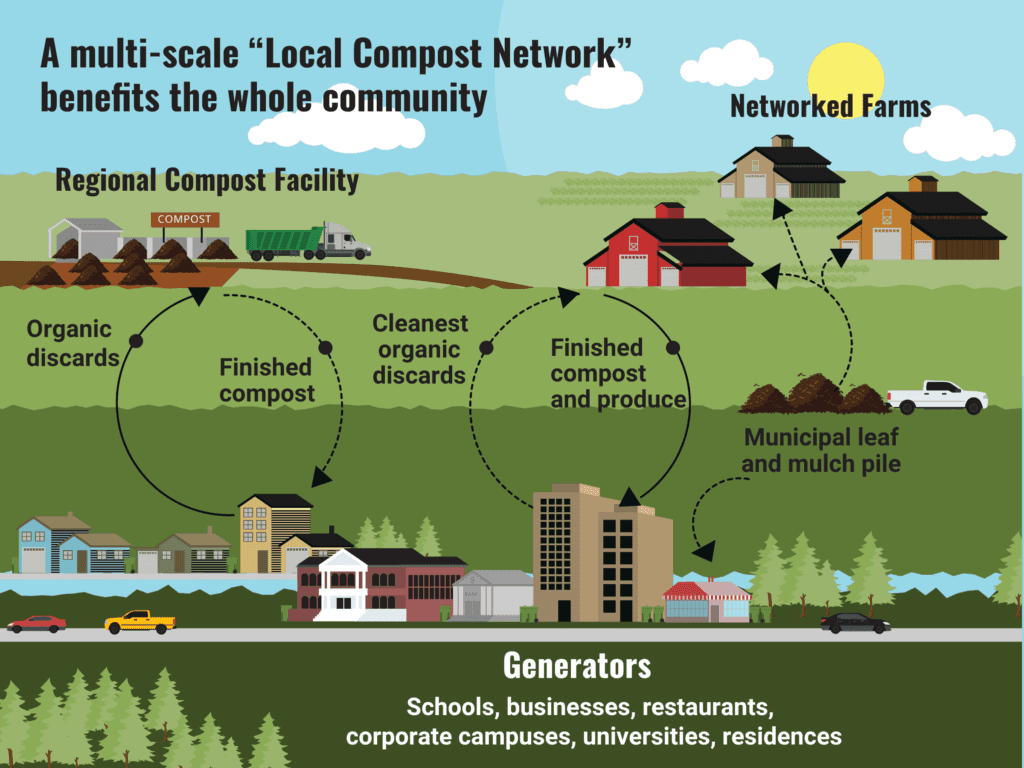
Keeping the Value of Compost Local and “Down on the Farm”
The circular economy for organic materials can be hyperlocal; plants can be composted back into the soil at the same house, garden, or farm where they were grown. While municipal curbside or drop-off programs have often relied on regional facilities, there is great value in a diversified, connected approach that links everyone generating organics—residents, schools, and businesses—with a distributed network of processors of all sizes.
This includes the smallest backyard composters, local on-farm and on-site composting operations (as piloted through Farmer First), municipally run mulch piles, entrepreneurial haulers and processors, and large-scale regional compost manufacturers. Together, these elements form a multi-scale Local Compost Network (LCN)—an integrated model that keeps nutrients circulating locally and prioritizes clean feedstocks for high-quality compost production and soil application. Colorado’s depleted soils and strong agricultural communities stand to benefit as Farmer First expands and links into a countywide LCN.
Farmer First Partnerships
Our Farmer First circular composting program brings together:
- Schools, restaurants, and businesses that generate clean, food-only scraps
- Local farms and food growers who turn those scraps into compost—and use it to grow food right here at home
Together, we’re building a stronger, more connected food and composting system in Boulder County.
 Partners Generating Clean Organics
Partners Generating Clean Organics
Schools that provide clean food scraps:
- Several Boulder Valley School District schools are participating.
Businesses that provide clean organics:
- Avery Brewery
- Bramble and Hare
- Jacob’s Mushrooms
- Niwot Market
- Spruce Confections
Partner Farmers
Farms producing clean compost on-farm:
- Black Cat Farms
- Capella Ranch
- Common Name Farm
- MetaCarbon
- Nojo Farm
- Pemberton Farm
- Speedwell Farm and Garden
- Vulture Ventures
Farms that provide crop residue (agricultural waste):
- Growing Gardens
- Wild Wellspring Farm
Community-led on-site composting:
- Palo Park (Boulder Housing Partners)
How you can support the Farmer First Compost Program
If you are a . . .
- business in Boulder County producing clean, contamination-free organic discards, and are interested in becoming a “clean compost generator,” contact Rutger Myers, Eco-Cycle Compost and Carbon Farming Director, at [email protected].
- Longmont business new to composting, but working to be compliant, contact Jeff Reifinger, Compost Project Manager, at [email protected].
- farmer or food grower in Boulder County who would like to produce high-quality compost on-site, contact Rutger Myers, Eco-Cycle Compost Director, at [email protected].
- community member who would like to help spread the word about the Farmer First program through workplace or community group presentations, please contact Rutger Myers, [email protected].
- business, foundation, or organization interested in funding this closed-loop community compost system, and help launch it in other communities, please contact Anna Leske, Advancement Officer, at [email protected].
























